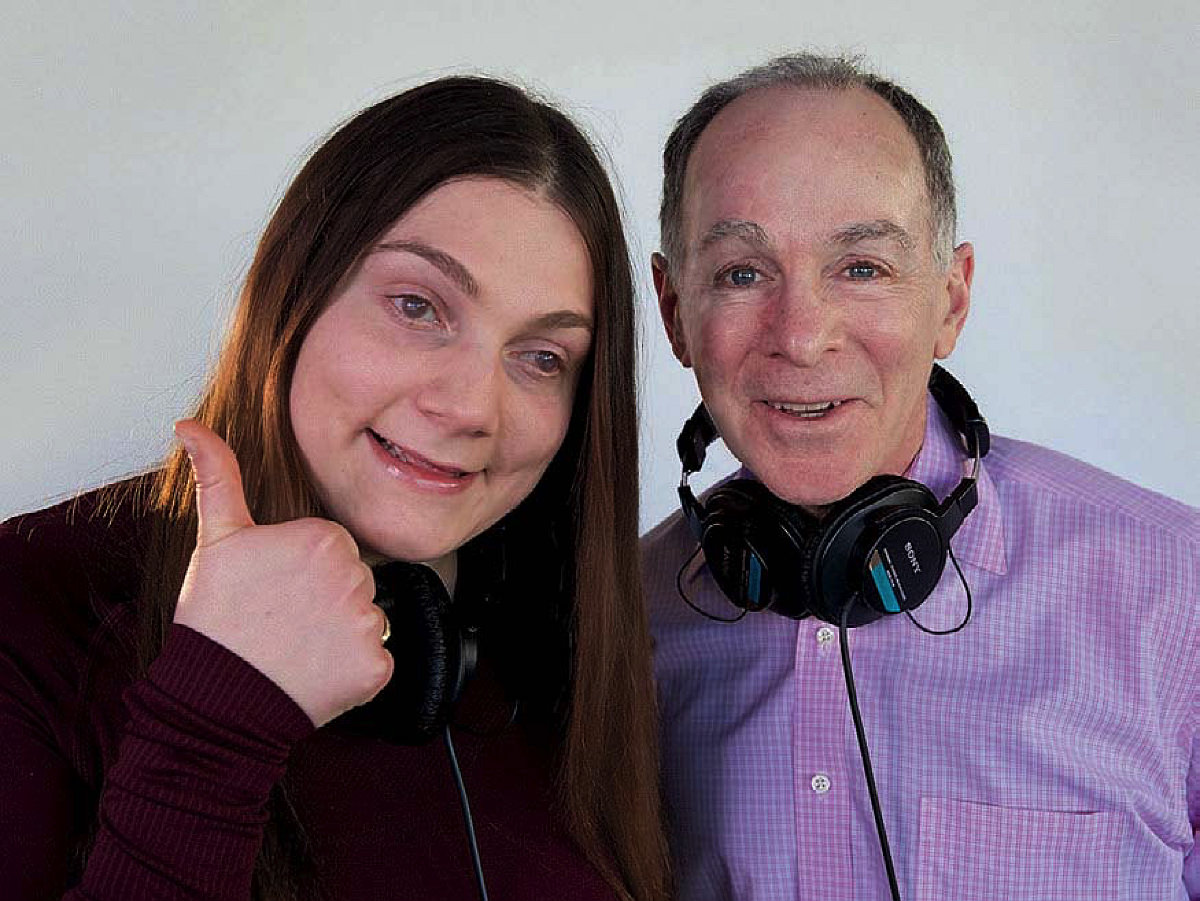When Juna Gjata ’17 was growing up, everyone she knew seemed to be on a diet. Weight-conscious adults ordered salads with dressings on the side, requested coffee without milk or sugar, and ate unflavored rice cakes. Her high-school friends followed along. “None of us were overweight,” she says. “But everybody always said, ‘Oh, I’m going to diet for the prom, and I’m going to diet for this.’” Gjata restricted her food, too: at pizza parties, she made sure not to indulge in more than a single slice.
Worsening Gjata’s self-esteem were the constant compliments paid to her slimmer younger sisters. “Everyone always said, ‘Oh, my God, you’re so skinny and tall,’” she recalls. “‘You could be a model.’” Her mother’s suggestion that she could someday play a managerial role for her middle sibling didn’t help. “Every little girl’s dream,” Gjata jokes, “is to be told she could be her skinny sister’s modeling manager.”
In the first season of her podcast, “Food, We Need to Talk,” launched in 2019 by Boston’s National Public Radio affiliate WBUR, Gjata discussed how she restricted her diet even more in college. She stuck to crouton-less salads in the dining hall and went to the gym twice a day. Her goal was to become a size four. Instead, she gained 15 pounds.
With the tagline, “One woman’s guide to end her war with food,” the podcast is a response to Gjata’s longtime struggles with diet and body image. Alongside co-host Edward Phillips, a Harvard Medical School associate professor of physical medicine and rehabilitation, Gjata rigorously and humorously explores subjects from exercise to food addiction to the low-quality, heavily processed Standard American diet.
In the opening episode, Phillips playfully interrogates Gjata on the goal that goes on to define the season. “Would you rather be happy,” he asks, “or a size four?”
“If I had to choose, I’d rather be both,” she responds. “But, I guess if I were happy, then I’d probably be OK either way.”
They decide that Gjata should aim to improve her health and self-image in a way that feels effortless. “I want to feel good about what I’m eating, how I’m moving and going about my tasks,” she says. “Like I don’t have to fight my own body on things.” “So you want to be free?” Phillips responds. For a podcast animated by expert interviews and scientific research, it’s a refreshingly straightforward goal.
Gjata was born in Albania and likely would have stayed had she not suffered a serious allergic reaction around her fourth birthday. Transferred from an Albanian hospital to a Greek intensive care unit, she was diagnosed with Stevens Johnson Syndrome, a potentially life-threatening autoimmune reaction, usually to a medication. The slow response gave the disorder time to damage her corneas. “It’s kind of like having scratched glasses pasted onto your eyeballs,” says Gjata, who is legally blind. “Everything is always going to be blurry.”
The family moved to Boston’s Roslindale neighborhood for medical treatment and stayed because the schooling system better accommodated vision problems. Her parents also signed her up for piano lessons, which she often begged to quit. She imagined she might be a lawyer while a student at the Boston Latin School, but the joy she felt during her senior piano recital changed her mind. “I was like, ‘‘That is what I want to do for the rest of my life,’” she recalls.
Gjata entered Harvard hoping to find a passion associated with a less daunting career path. But despite concentrating in cognitive neuroscience and evolutionary psychology, she fell further into piano. She practiced six to eight hours a day and refused to go on family vacations unless she could bring a keyboard. The grind took a toll on her health. She developed tennis elbows in both arms and suffered from a pinched nerve. As her condition worsened, her beloved performances became anxiety-inducing experiences.
If she couldn’t control the outcome of her practicing, she thought she could at least control her body. “All I worked on each semester,” she says, “was trying to lose weight and be better at piano.” She brought a scale and measuring cups to the dining hall, praying no one watched as she served herself tiny meals that kept her at 1,200 calories per day. She talks on the podcast about falling into bouts of stress eating, consuming half a dozen protein bars in a sitting.
Weighed down by casts on her wrists and elbows, Gjata took a short break from piano after graduation and found that she didn’t miss it. “That’s honestly when I realized…it’s so much easier for me to perform in other ways that aren’t so much pressure,” she says. She reached out to former WBUR editor Carey Goldberg and proposed a podcast on personal health. “I felt like there was no professional place where people were talking about information in a scientific way,” she says. Models and personal trainers offer diet and workout advice, but “a lot of them have not really done the research or due diligence to make sure that what they’re saying is correct.” Drawn by Gjata’s background, voice, and written proposal, Goldberg brought along Eddie Phillips and the first season began.

Gjata with her co-host, Edward Phillips
Photograph courtesy of WBUR
Gjata learned how to execute the podcast on the job. She reached out to guests personally and interviewed each for more than an hour. She then fit recorded excerpts into scripts she wrote for Phillips and herself, leaving room in her own lines for improvisation. While recording, she follows the scripts on an electronic braille reader. She chose topics that had always weighed on her in her struggle with food—weight and genetics, stress, dietary guidelines—and usually found while doing background research that the guidance was not so confusing after all.
The show’s strength draws from the warm, jocular connection between Gjata and Phillips—who she affectionately refers to as her “American dad”—as Gjata talks through issues most keep to themselves. During an interview with an eating-disorder specialist, she found herself identifying strongly with the expert’s description of people whose self-esteem is dominated by their weight and appearance. When the interview ended, Gjata sought professional help for her eating disorder for the first time.
After a 2019-2020 season that received 1.4 million downloads, season two debuted this April with public media organization PRX. (The duo also wrote a book under the same name as the podcast, to be published in July 2023.) During slightly longer episodes that explore scientific and cultural nuances of subjects like calories, metabolism, and the history of dieting, Gjata guides the audiences through another round of episodes she wished she had access to earlier in life. “I mean, everything I do is kind of for my younger self, right?” she says. “We all do that.”









